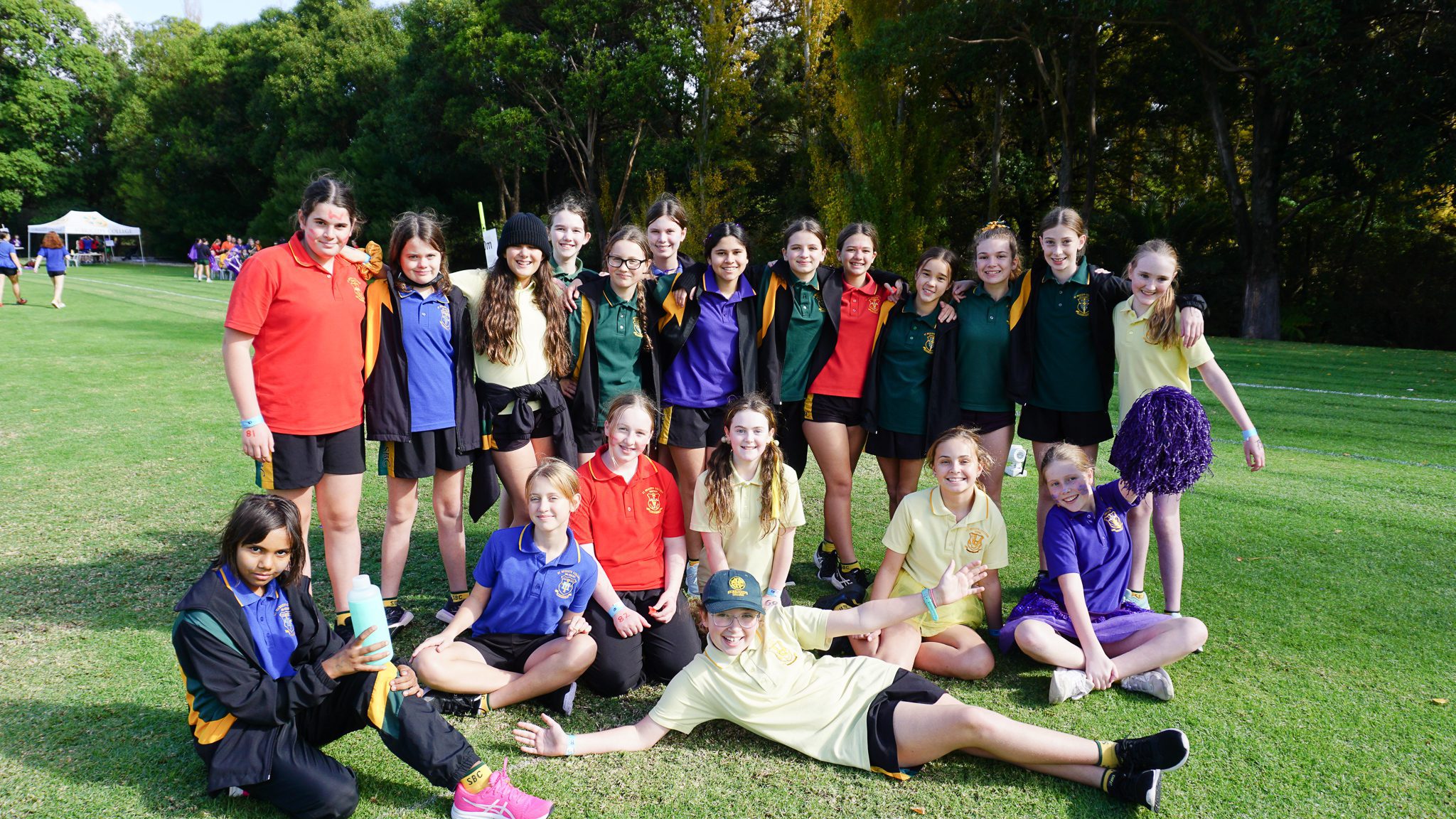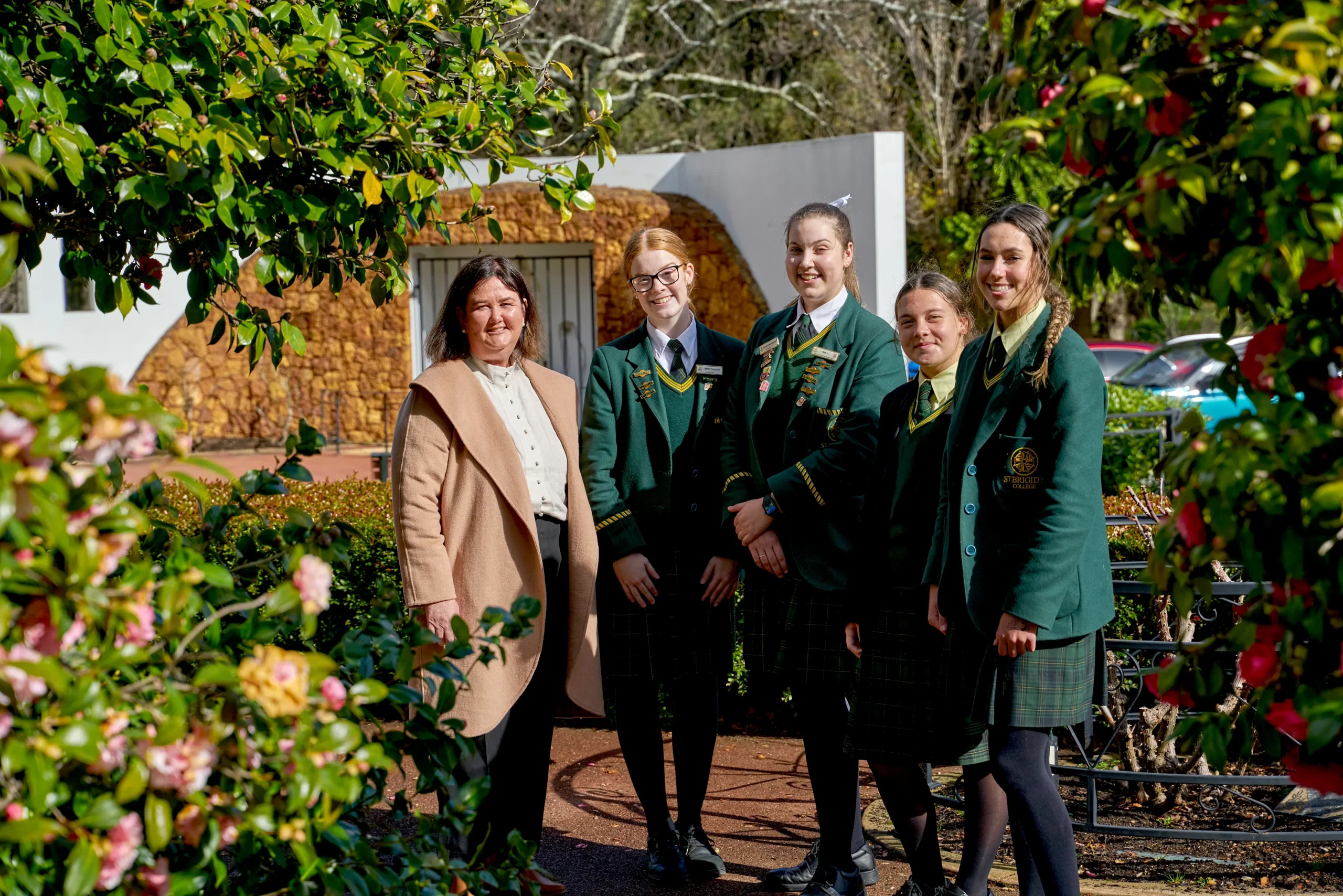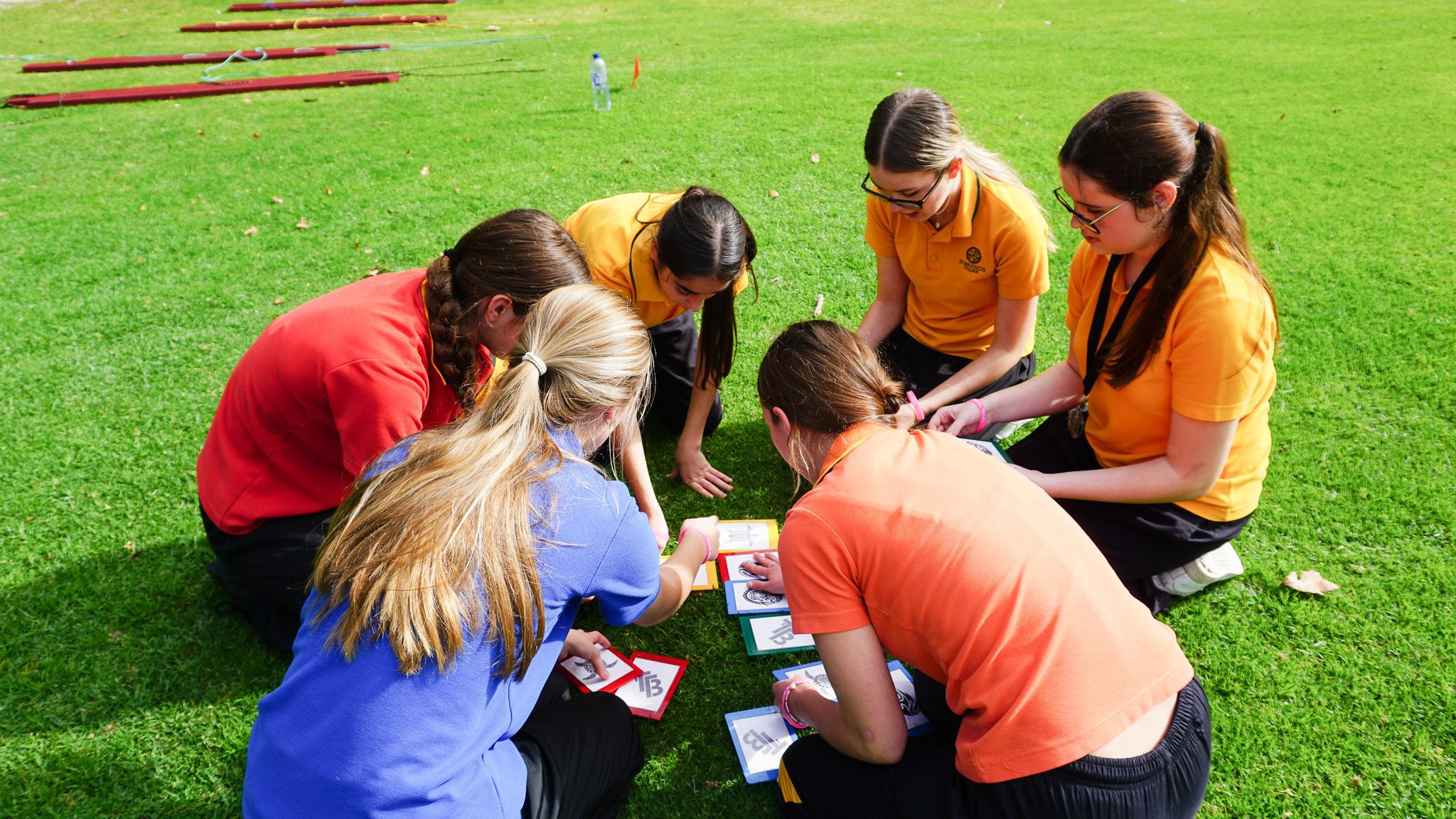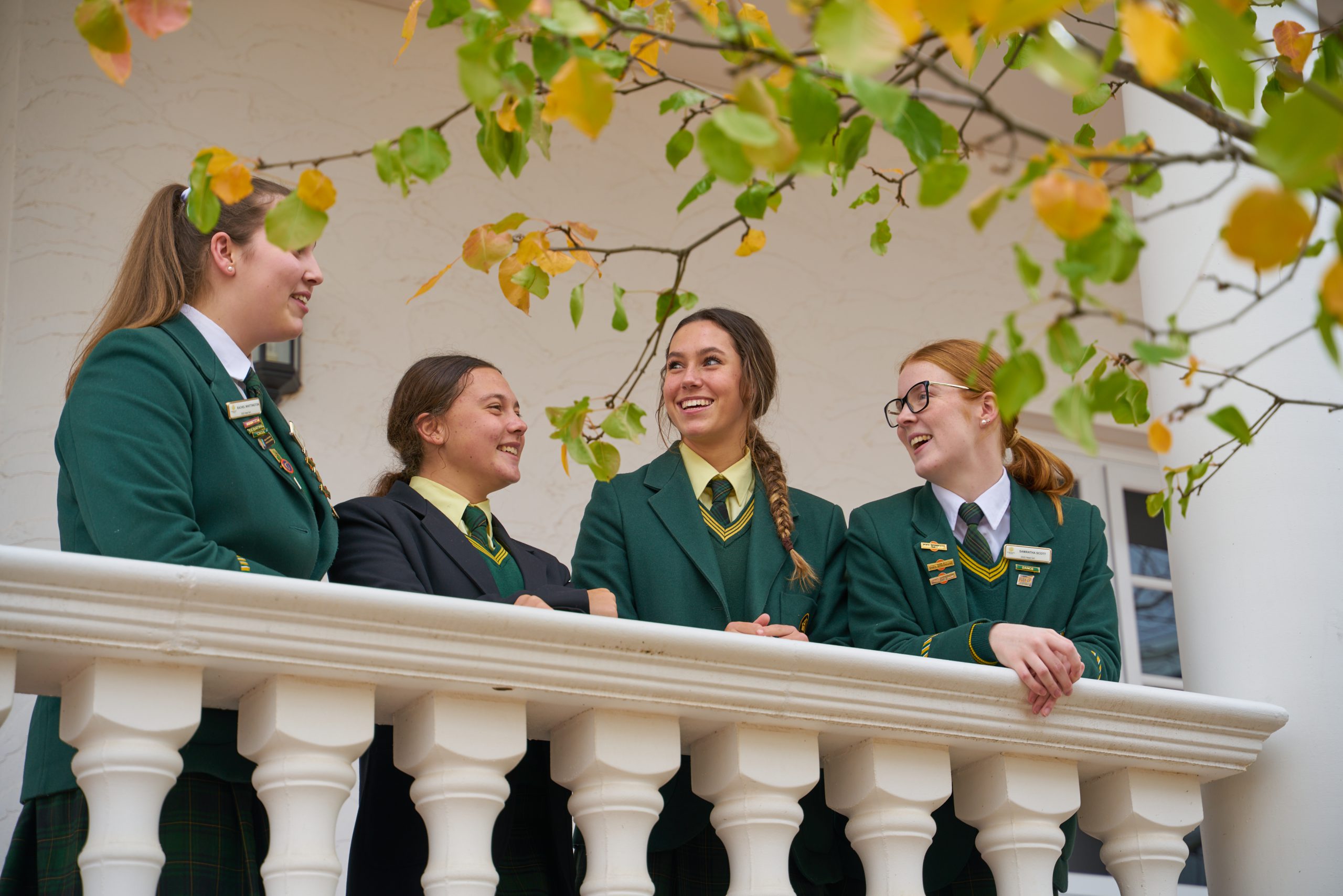For Years 7 to 12
St Brigid’s College is dedicated to providing its students with an excellent education that prepares them for their future endeavours. The Secondary School curriculum has been specifically designed to provide opportunities for students to develop skills and attitudes that will allow them to make informed choices about their future. The College recognises that each student has unique needs, interests, and strengths, and thus offers a wide range of subjects to cater to their individual requirements.


Years 7 to 9
In Years 7 to 9, it is recognised that our young women face challenges associated with the transition as they move from being children to becoming young adults. At St Brigid’s, various middle schooling methodologies are adapted to ease this period of transition and to ensure that St Brigid’s maximises the learning opportunities for all students.
The Western Australian Curriculum is the mandated curriculum for the planning, assessment and reporting of student progress. We challenge our girls to reach their potential, serve the wider community and understand that education is an instigator of change.
Co-Curricular
Year 7-9s have a large selection of Co-curricular activities to participate in before, during and after school. Click here for a full list of available activities.
For further information please contact our Head of Secondary Ms Fiona Hepi on 9290 4200.

Years 10 to 12
Students are provided with the necessary skills to meet the challenges of the 21st century with faith and hope. At St Brigid’s, we recognise the challenges associated with the transition that young people experience as they move from being children to becoming adults. Students are encouraged to develop new skills in time management and independent learning, as the academic rigour of their courses increases.
Students are encouraged to pursue personal excellence in a nurturing environment that focuses on the development of the whole person. Interpersonal and self-management skills, which are a vital part of becoming independent and responsible life-long learners, are at the heart of the Secondary School philosophy.
St Brigid’s College challenges young women to take on a responsible role in the wider local, national and international communities and to be proactive members of our society. There are many opportunities for leadership and service provided. All students are encouraged to develop their personal qualities and strengths by participating in programmes, and in the exceptional range of co-curricular sporting and cultural opportunities offered.

Learning at St Brigid’s College
Broadly, there are four options for course selections that are available to students:
- ATAR (Australian Tertiary Admission Rank) courses
- General courses
- Vocational Education and Training (VET) Certificates
- Endorsed programmes It is also possible to ‘mix and match’ these options to provide yourself with the best platform to meet the requirements to attain the Western Australian Certificate of Education (W.A.C.E.) and prepare yourself for life beyond school
These courses are typically for students aiming to achieve entry to an Australian university directly from school. ATAR courses are examined by the School Curriculum and Standards Authority. Each course has four units:
- Units One and Two (Year Eleven units)
- Units Three and Four (Year Twelve units)
Units Three and Four must be studied as a pair, as the ATAR examination covers both units. If you intend to enrol in university study after school, you should study at least four ATAR courses at Year Twelve in order to be eligible for an Australian Tertiary Admission Rank. The rank is used by universities around Australia as a selection device. More information about the ATAR is available from the Tertiary Admissions Service Centre (TISC) – see here for more information.
General courses are typically for students aiming to enter further training or the workforce directly from school. These courses are not examined externally, although students will sit the Externally Set Task (administered by the SCSA) during Year Twelve in mid-Term Two. It may be possible to enter some university undergraduate courses using your school-based general courses (or a mixture of general and ATAR courses).
An endorsed programme is a significant learning program that has been developed for senior secondary students. The programme may have been developed by the School Curriculum and Standards Authority, or it may have been developed by a private provider or a school and subsequently endorsed by the Authority. Each endorsed program consists of a series of lessons, classes and/or activities designed to lead to the achievement of a common goal or set of learning outcomes. Endorsed programmes can be delivered as part of the school curriculum or as extracurricular activities.
All endorsed programmes successfully completed and reported to the Authority by the school:
- are listed on the Western Australian Statement of Student Achievement.
- may contribute towards the breadth-and-depth requirement of the W.A.C.E.
- may contribute towards the C grade requirement of the W.A.C.E. Each endorsed programme is allocated one, two, three or four unit equivalents.
A student who will graduate in 2018 or beyond will be able to count a maximum of four unit equivalents from endorsed programs for W.A.C.E. purposes, two in Year Eleven and two in Year Twelve. Programmes are endorsed in three categories:
-
Authority-developed endorsed programmes. These endorsed programmes are developed by the Authority to provide W.A.C.E. recognition for students undertaking activities of a similar nature and for which no quality-assured certificate or award is issued. A program outline that provides details of the program and the completion requirements can be downloaded by clicking on the link above.
-
Provider-developed endorsed programmes. These endorsed programmes are developed by a private provider such as a university, community organisation or training institution. Provider-developed endorsed programmes recognise structured learning programmes that result in the attainment of a quality-assured certificate or award.
-
School-developed endorsed programmes. These endorsed programmes are developed by individual schools in response to a particular need which cannot be met through a W.A.C.E. course, a VET qualification or another endorsed programme.
College Awards
The aim of the College Awards is to recognise students’ exemplary contributions, endeavours and/or high achievements in school life or while representing St Brigid’s College. Prizes are awarded for success or outstanding endeavour in a range of areas such as service, leadership and performance. Special awards recognise the achievements of Year 12 students.
Responsible Christian Learner Awards (Pre-Primary – Year 11)
These awards are presented at final Year assemblies. The Responsible Christian Learner award is presented to students who:
- Persevere with tasks, they don’t give up when things get difficult, they stay engaged;
- Ask clarifying questions if they are not sure of the task;
- Ask for help after they have tried to solve the problem
- Come prepared to lessons
- Work to timelines;
- Are prepared to put their own position in a self-confident but acceptable way;
- Accept the consequences of their own actions rather that making excuses or blaming others;
- Volunteer to help others.
The St Brigid’s College Community Award (Years 6 – 9)
Is presented to a student who has demonstrated a commitment to serving others. The recipient of this award has assisted regularly at community activities and events outside of school. This student has a selfless, positive and supportive attitude and encourages the same in others.
St Brigid’s College Christian Leadership Award (Years 6 – 11)
Is awarded to a student who has led other students through a willingness to serve and witness the truth of the Christian faith and our College values.
Daly Sisters’ Justice Award (Years 6 – 12)
Is awarded to a student who has been active in working to overcome injustice, walking in the way of righteousness through a personal involvement in justice activities and Mercy in Action service.
The Parent Forum Community Award for Boarding (Years 7-11)
Is presented to a student who has demonstrated commitment to serving others. The recipient of this award has helped out regularly at community activities outside of school hours. This student has a positive, supportive attitude to activities and encourages the same in others.
The O’Connor Sisters’ Award (Years 7 – 12)
Is awarded to a student who is steadfast, courageous and strong in her faith. The recipient of this award displays outstanding community participation, such as being an active participant in Parish life, and demonstrates the values of Mercy in her behaviour.
Sportswoman of the Year Award
Is presented to a Senior School student for outstanding achievement and contribution to the area of sport while representing St Brigid’s College.
The Shield of St Cecilia
Is awarded to the Outstanding Chorister of the Year for her leadership as an outstanding vocalist.
The Spirit of Mercy
The Spirit of Mercy Award is presented to one student from each Year group at a K-12 Assembly in the final week of term.
Spirit of Mercy Award ‘The true Spirit of Mercy is flowing on us’ (Catherine McAuley)
The Spirit of Mercy Award recognises students who consistently makes a positive contribution to our school community and always gives his/ her best to live our Mercy values of compassion, justice, respect, hospitality, courage and service. The recipient of the Spirit of Mercy Award is a student who is recognised as quietly going about being a person who is authentically “Mercy”. They are always prepared to contribute to working for a “fairer world”. They face the challenges of learning with resilience and optimism, always seeking excellence. The recipient of the Spirit of Mercy Award always welcomes others into our community. The recipient walks in the footsteps of our foundress Catherine McAuley.
The Australian Defence Long Tan Youth Leadership and Teamwork Award
Is presented to a year 10 and year 12 student who demonstrates a level of leadership ability, fosters cooperation and positively contributes within a team. The recipient generates workable solutions to problems while maintaining the values of the school and the community.
The Friends of St Brigid’s Community Award
Is awarded to a Year 11 student who has demonstrated a strong commitment to promoting the College. She is someone who comes forth to assist and represent the College, both inside and outside the school. The recipient of this is award is welcoming of others just as Christ welcomed all.
Shield of Mothers Philip and Agatha for Musician of the Year
Awarded to a student who has involved herself fully in the College’s Music Performance Groups. The recipient demonstrates music leadership and maintains a high level of personal musical skill.
The Sister Mary Evangeliste Shield
Is named in memory of Sr Evangeliste who taught at this College and had a particular interest in sport for women. The shield is presented to a Year 12 student who has made a significant contribution to sport.
The Boarding Parents Community Award
Is presented to a boarder who has shown dedication, commitment and a vitality of spirit towards the betterment of the boarding community.
City of Kalamunda All Rounder Award
Is awarded to a student who displays consistent commitment and participation across many areas of College life.
The Sister Pius Stanley Award
Is presented to a boarder who has lived the Mercy Ethos during her time in Boarding. The recipient is compassionate and consistently demonstrates kindness and humility. She is patient in her daily interactions with others and embraces daily challenges with conviction.
The Australian Defence Long Tan Youth Leadership and Teamwork Award
Is presented to a year 10 and year 12 student who demonstrates a level of leadership ability, fosters co-operation and positive contributions within a team. The recipient generates workable solutions to problems while maintaining the values of the school and the community.
Catherine McAuley Award
This award is presented to a student who has consistently demonstrated a positive attitude and who, like Catherine McAuley, is prepared to accept challenges and challenge appropriately; a young woman who displays dignity and who is committed to preserving the dignity of others. This student is recognised for her involvement and participation in the life of the College and her commitment to the Mercy values.
The Our Lady of Lourdes Parish Award
Is presented to a student who has is consistent active Christian witness to others within the College and within the Lesmurdie Parish community. The award is at the discretion of the Parish Priest.
Is bestowed on a student for her outstanding contributions to the College community. This award, along with the Catherine McAuley is seen as the highest recognition that St Brigid’s can make to acknowledge meritorious involvement and participation of a student in the life of the College.
The College Dux is awarded to the overall top performing students at the College in both the ATAR and VET Pathways.
The calculation of the ATAR Dux is:
- Addition of top 4 scoring ATAR subjects.
- In the case of a tied situation, the College will calculate the aggregate based on the top 5 and 6 ATAR subjects.
- Should a tied position remain, an aggregate using the results from the top 4 Trial WACE examination results will be calculated.
- In the unlikely event, a tied position remains, the Senior Leadership Team of the College will ascertain a single student to be awarded the Dux Award.
- The second placed student will be awarded the Runner up Dux Award for ATAR.
The calculation of the VET Dux is:
- Addition of top 4 scoring WACE subjects.
- The student must complete their appropriate certification.
- In the case of a tied situation, the College will calculate the aggregate based on Year 11 results achieved in their top 4 scoring WACE subjects.
- In the unlikely event, a tied position remains, the Senior Leadership Team of the College will ascertain a single student to be awarded the Dux Award.
- The second placed student will be awarded the Runner up Dux Award for VET.
Awards Progression
Certificate of Merit
Awarded to students who meet criteria 1-5 for one season or year.
Badge
Awarded to students who have made at least two seasons or years’ contribution or the equivalent to St Brigid’s College in a given field of endeavour and have met criteria 1-5.
Colours
Awarded to students who have made at least three years’ commitment to St Brigid’s College in a given field of endeavour, have demonstrated an outstanding level of skilled performance or leadership and have met criteria 1-5.
Honours
Awarded to students who have made an ongoing and substantial contribution to St Brigid’s College, met criteria 1-5 and whose contribution, achievement is outstanding in their chosen field of endeavour. Students nominated for honours must have already received a Merit Certificate, Badge and Colours for their chosen field of endeavour.
Once a student has been awarded Honours, she is entitled to wear the appropriate symbol on her Blazer pocket.
Criteria for Selection for Merit, Badge, Colour and Honour Awards K-12
A student shall have:
- Shown a Christian attitude towards their teachers and other members involved in their chosen field of endeavour;
- Attended preparation, training and planning sessions promptly, regularly and with positive commitment to instruction in their chosen field of endeavour;
- Attained a level of personal excellence in their chosen field of endeavour;
- Demonstrated that they have reflected the College Values;
- Provided ongoing service to the College Community as required in their chosen field of endeavour.
